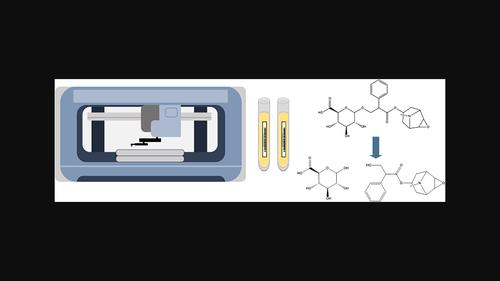当前位置:
X-MOL 学术
›
Drug Test. Anal.
›
论文详情
Our official English website, www.x-mol.net, welcomes your feedback! (Note: you will need to create a separate account there.)
Automated enzymatic hydrolysis of urine samples for improved systematic toxicological analysis of drug-facilitated sexual assault cases
Drug Testing and Analysis ( IF 2.9 ) Pub Date : 2024-01-23 , DOI: 10.1002/dta.3640 Kathrine Skov 1 , Sys Stybe Johansen 1 , Kristian Linnet 1 , Marie Katrine Klose Nielsen 1
Drug Testing and Analysis ( IF 2.9 ) Pub Date : 2024-01-23 , DOI: 10.1002/dta.3640 Kathrine Skov 1 , Sys Stybe Johansen 1 , Kristian Linnet 1 , Marie Katrine Klose Nielsen 1
Affiliation

|
Drug-facilitated sexual assault (DFSA) is characterized by victim incapacitation due to intoxicating substances. Detection of single drug exposure from DFSA requires a systematic toxicological analysis strategy including sensitive methods covering a broad spectrum of substances. The aim of this study was to develop and validate an UHPLC–MS/MS screening method for analysis of samples from DFSA cases and incorporate an automated enzymatic pre-treatment of urine samples into a robotic sample preparation for an efficient laboratory workflow. The screening method included 144 drugs of abuse, pharmaceuticals, and metabolites relevant to DFSA. The use of a recombinant enzyme showed an efficient glucuronide hydrolysis with an average parent drug recovery of 97%. Investigation of matrix effect showed no pronounced ion enhancement or suppression for most analytes (96%), and extraction recovery was above 80% for 97% of analytes. Process efficiency ranged from 50% to 138% for most analytes. The LODs ranged from 0.0001 mg/L to 2 mg/L depending on analyte, and most analytes met the SOFT recommended minimum performance limits. The validated method was applied to authentic suspected DFSA cases (n = 38). Results showed that drugs of abuse, benzodiazepines, and antidepressants were most commonly found in suspected DFSA cases. Incorporation of an automated enzymatic hydrolysis step during sample preparation enables a fast and simple workflow for simultaneous analysis of blood and urine samples for an improved systematic toxicological analysis strategy for DFSA cases.
中文翻译:

对尿液样本进行自动酶水解,以改进药物性侵犯案件的系统毒理学分析
药物性性侵犯(DFSA)的特点是受害者因中毒物质而丧失行为能力。检测 DFSA 中的单一药物暴露需要系统的毒理学分析策略,包括涵盖广泛物质的敏感方法。本研究的目的是开发和验证一种用于分析 DFSA 病例样本的 UHPLC-MS/MS 筛选方法,并将尿液样本的自动酶预处理纳入机器人样本制备中,以实现高效的实验室工作流程。筛选方法包括 144 种与 DFSA 相关的滥用药物、药品和代谢物。重组酶的使用显示出有效的葡萄糖醛酸水解,平均母药回收率为 97%。基质效应研究表明,大多数分析物 (96%) 没有明显的离子增强或抑制作用,97% 的分析物的萃取回收率高于 80%。对于大多数分析物,处理效率范围为 50% 至 138%。LOD 范围为 0.0001 mg/L 至 2 mg/L,具体取决于分析物,大多数分析物均符合 SOFT 建议的最低性能限值。经验证的方法适用于真实的疑似 DFSA 病例 ( n = 38)。结果显示,疑似 DFSA 病例中最常见的是滥用药物、苯二氮卓类药物和抗抑郁药物。在样品制备过程中加入自动酶水解步骤,可以实现快速、简单的工作流程,用于同时分析血液和尿液样品,从而改进 DFSA 病例的系统毒理学分析策略。
更新日期:2024-01-24
中文翻译:

对尿液样本进行自动酶水解,以改进药物性侵犯案件的系统毒理学分析
药物性性侵犯(DFSA)的特点是受害者因中毒物质而丧失行为能力。检测 DFSA 中的单一药物暴露需要系统的毒理学分析策略,包括涵盖广泛物质的敏感方法。本研究的目的是开发和验证一种用于分析 DFSA 病例样本的 UHPLC-MS/MS 筛选方法,并将尿液样本的自动酶预处理纳入机器人样本制备中,以实现高效的实验室工作流程。筛选方法包括 144 种与 DFSA 相关的滥用药物、药品和代谢物。重组酶的使用显示出有效的葡萄糖醛酸水解,平均母药回收率为 97%。基质效应研究表明,大多数分析物 (96%) 没有明显的离子增强或抑制作用,97% 的分析物的萃取回收率高于 80%。对于大多数分析物,处理效率范围为 50% 至 138%。LOD 范围为 0.0001 mg/L 至 2 mg/L,具体取决于分析物,大多数分析物均符合 SOFT 建议的最低性能限值。经验证的方法适用于真实的疑似 DFSA 病例 ( n = 38)。结果显示,疑似 DFSA 病例中最常见的是滥用药物、苯二氮卓类药物和抗抑郁药物。在样品制备过程中加入自动酶水解步骤,可以实现快速、简单的工作流程,用于同时分析血液和尿液样品,从而改进 DFSA 病例的系统毒理学分析策略。



























 京公网安备 11010802027423号
京公网安备 11010802027423号